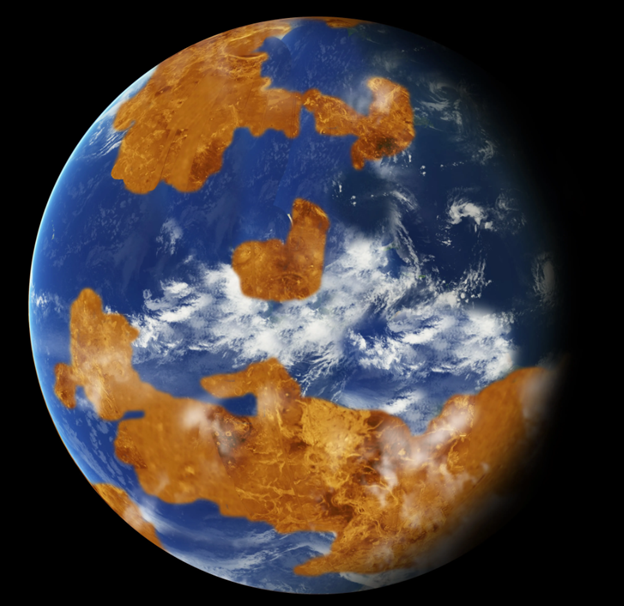Among its other hellish conditions, Venus is bone dry, despite having once had plenty of water. Where did it all go? A new analysis attributes it to “dissociative recombination”, which caused a loss of hydrogen atoms at twice the rate of previous estimates.
Science fiction writers once set their works in the oceans of Venus, which they imagined sat beneath those endless clouds. Once spacecraft checked our neighbor out, the horrifying heat made clear there’d be no liquid water – but where was all the water vapor? Scientists have continued to ponder why Venus is hot and dry, rather than hot and wet, and what the implications might be for planets with more hospitable temperatures.
Venus probably started out with a fairly similar amount of water to Earth. Yet it has a hundred-thousandth as much left, all of it in the atmosphere, rather than being distributed between ice, ocean, and air like Earth’s.

Once Venus had similar amounts of water to Earth. It must have gone somewhere.
Image Credit: NASA
The turbocharged Greenhouse Effect on Venus would have boiled off its water, leading to the steam escaping. However, if steam loss was the whole story, water equivalent to a global layer 10-100 meters (33-330 feet) deep should have been left behind.
“As an analogy, say I dumped out the water in my water bottle. There would still be a few droplets left,” said Dr Michael Chaffin of the University of Colorado, Boulder in a statement. Chaffin is part of a team blaming the molecule HCO+, which they have already identified as a major culprit in Mars losing most of its water.
There’s evidence to support the confidence Venus once had Earth-like quantities of water. Deuterium (hydrogen’s isotope with one neutron) is less likely to escape than ordinary hydrogen, and the ratio of hydrogen to deuterium reveals how much was once present.
Whether there is a little H2O in Venus’s atmosphere or a lot, some of it combines with carbon dioxide at altitudes to produce HCO+. However, the upper atmosphere also has plenty of free electrons, which recombine with the HCO+, leaving carbon monoxide and hydrogen atoms.
As the lightest element, hydrogen escapes easily from small planets’ gravity when it doesn’t have a heavier partner to anchor it. Unlike helium, hydrogen bonds easily to other atoms, so in the normal course of events it stays home. HCO+ provides a stepping stone to hydrogen becoming free long enough to escape. In Venus’s case, Chaffin and co-authors think, so much escaped that there’s not enough left to make water, and the oxygen has to go bond with something else.
In order to explain Venus’s desiccated state, the team thinks there must have been a lot more HCO+ in its atmosphere than previously anticipated.
Once all the hydrogen is lost, the HCO+ will be gone, but the authors don’t think we’re there yet. They think it should still be possible to identify small amounts of the molecule to confirm their hypothesis. “One of the surprising conclusions of this work is that HCO+ should actually be among the most abundant ions in the Venus atmosphere,” Chaffin said.
Once HCO+ was included in the models, Chaffin and co-authors found the anticipated amount of water roughly matches what we see today, and the hydrogen/deuterium ratio is in the right ballpark as well.
None of the spacecraft we have sent to Venus have detected any HCO+. However, the team thought that is because the instruments they carried were not suited to finding it.
The forthcoming Deep Atmosphere Venus Investigation of Noble gases, Chemistry, and Imaging (DAVINCI) won’t change that, but if this explanation is judged plausible future missions might. Much more than our understanding of Venus rests on this.
“There haven’t been many missions to Venus,” study co-author Dr Eryn Cangi said. “But newly planned missions will leverage decades of collective experience and a flourishing interest in Venus to explore the extremes of planetary atmospheres, evolution and habitability.”
“Water is really important for life,” Cangi added. “We need to understand the conditions that support liquid water in the universe, and that may have produced the very dry state of Venus today.”
The study is published in the journal Nature.
Source Link: Where Did Venus’s Water All Go? We Might Have An Idea